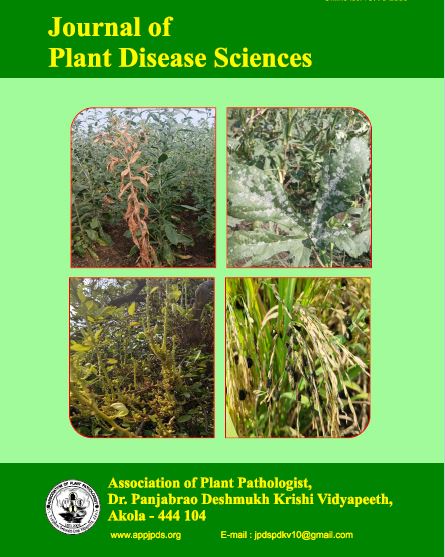Screening Of Chickpea Genotypes For Wilt Resistance
DOI:
https://doi.org/10.48165/Keywords:
Chickpea, Fusarium oxysporum f. sp. ciceri, Genotypes, ScreeningAbstract
Development of resistant varieties is the viable strategy to overcome wilt of chickpea caused by Fusarium oxysporum f.sp. ciceri (Padwick) Synd. & Hans. However, difficulties associated with the development and maintenance of uniform wilt sick plots for screening have hindered the process of developing resistant cultivars. Thus, there is a need for more efficient methods for screening cultivars against the disease. In this regards these resistant sources by screening promising entries will be identified for F. oxysporum f. sp. ciceri race specific isolates and new variant. Studies on host resistance under multiple disease sick field led to conclusion that among 285 entries two entries showed less than 10 percent mortality and may be considered as resistant, 11 entries exhibited 10.1 to 20 percent mortality and regarded as moderately resistant during first year, however in secon year six entries showed less than 10 percent mortality and considered as resistant, 14 entries exhibited 10.1 to 20 percent mortality and regarded as moderately resistant.
References
Gupta, Om, and A. Babbar, 2006: Identification of desi and kabuli chickpea genotype for multiple disease resistance against soil born diseases. Indian Journal of Pulses Research, 19(1): 129-130.
IIPR, 1999: Proceedings of Technical Programme for Rabi
Workshop.
Kumar, S., S. Sahni, and B. Kumar, 2019: Screening of chickpea genotypes for resistance against Fusarium wilt. Current Journal of Applied Science and Technology, 38(6): 1-6.
Leslie, J. F., B. A. Summerell, 2006: The Fusarium: Laboratory Manual. Blackwell Publishing Asia, Australia.
Mishra, A. N., A. R Shukla, and R. R. Singh, 1977:
Evaluation of resistant varieties and strains of gram against wilt. Indian Journal of Mycology and Plant Pathology, 6: 152-155.
www.appjpds.org
Nene, Y.L. and M.P. Haware, 1980: Screening of chickpea
for resistance to wilt. Plant Disease, 69: 379-380.
Nene, Y.L., V.K. Sheila, S. B. Sharma, 1989: A world list of chickpea and pigeon pea pathogens. In: ICRISAT Legume Pathology Program Report, Patancheru, India pp 7.
Nene, Y.L., V.K. Sheila, S. B. Sharma, 1996: A world list of chickpea and pigeon pea pathogens. ICRISAT, Hyderabad, India. Organized by Indian Institute of Pulse Research Kanpur, pp 13.
Singh, D.K., D. K. Jha and M.F. Haque, 1997: Field screening of chickpea against Fusarium wilt (In En.). Journal of Research. Birsa Agri. Univ., 9:2 201-202.
Singh, D.V., A.N. Mishra and S.N. Singh, 1974: Sources of resistance to gram wilt and breeding for the wilt resistance in Bengal gram in UP. Indian Journal of Genetics and Plant Breeding, 34: 239-241.
Turkkan, M., and F. S. Dolar, 2010: Determination of
fusaric acid production by Fusarium oxysporum f.sp. ciceri with thin layer chromatography and spectrophotometric methods. Anadolu Journal of Agriculture Science, 25: 146-150.

